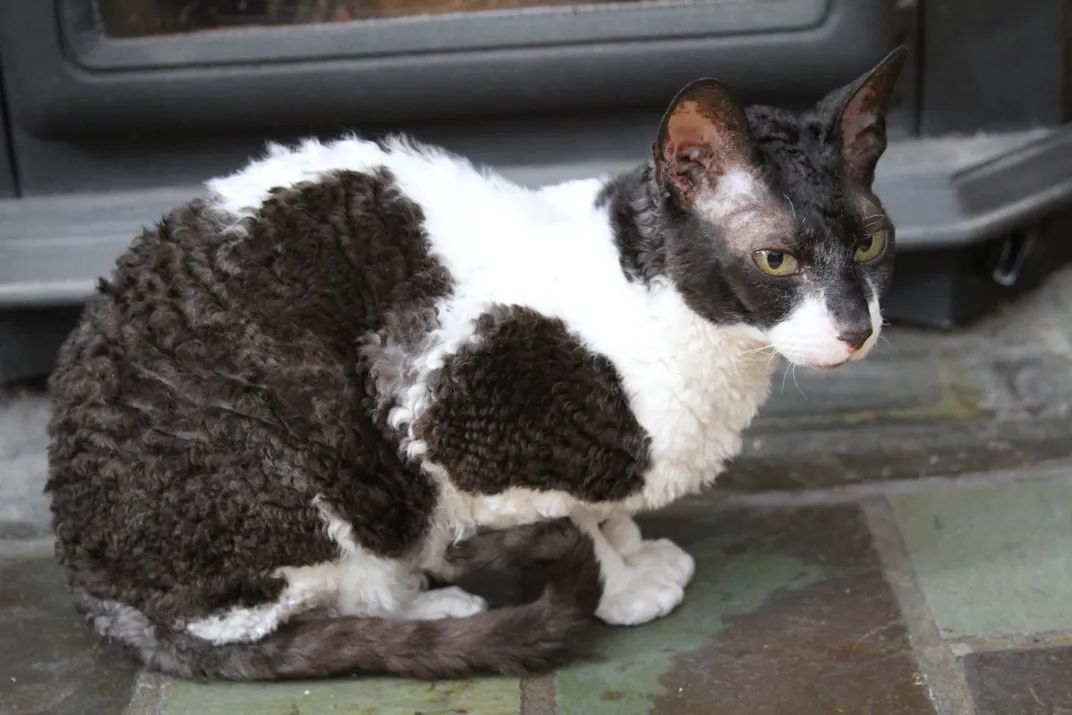Although Cornish Rexes do have significantly less fur than some of their feline relatives, they do still shed and are not hypoallergenic. However, people with cat allergies may find that Cornish Rexes are easier to be around than their longer-haired counterparts.
A Brief History of the Cornish Rex
Although cats were arguably domesticated almost 10,000 years ago, “fancy breeds” such as the Cornish Rex were developed only a century ago. In 1950, in Cornwall, England, a litter of British Shorthairs gave birth to the first Cornish Rex. The kitten, named Kallibunker by the breeder Nina Ennismore, stood out from the rest of its litter because of its unusual characteristics. Kallibunker’s body was slender and delicate, with an egg-shaped head, bat-like ears, unusually long legs, and curly short hair, as opposed to the stocky, dense body typical of a British Shorthair.
Ennismore discovered that the kitten’s peculiar appearance was the consequence of a spontaneous gene mutation after speaking with a geneticist. She bred Kallibunker with his mother in order to preserve it—it may sound strange, but this happens more often in animal breeding than you might think. A new breed was established when two more kittens with the same unique appearance were born. The new breed of Rex rabbits was named Cornish Rex by Ennismore, who also bred curly-haired Rex rabbits, after her rabbits and the origin of the kitten.
Because of its slim appearance and energetic personality, the Cornish Rex is often called the “greyhound of the cat fancy.” To keep the breed line pure, breeders can only breed a male and a female with the same wavy hair. This is because the “spontaneous genetic mutation that causes the thin hair coat and whiskers to grow in pattern waves instead of straight” is a recessive gene, write feline experts Benjamin and Lynette Hart in their book on cat breeds, Your Ideal Cat.

Breeders claim that while inbreeding can be difficult, it is necessary when working with the particular gene that gives rise to the Cornish Rex breed. Furthermore, Lyons notes that although excessive inbreeding may cause health issues for some species or breeds, “there are a lot of cat breeds that have a small population size that do quite well from a diversity point of view.” ”.
The Cornish Rex falls into that category. She continues, “The Cornish Rex mutation is recessive, so to keep all of your cats Rexes, you have to breed a Rex cat to a Rex cat.” Since the breed was founded with a strong foundation gene pool, the Cornish Rex appears to be one of the breeds that has lucked out and is relatively healthy. It isn’t linked to an exhaustive list of genetic issues. ”.
Persian cats, whose appearance has varied greatly over time, comprise the majority of this category among all the fancy breeds of cats. Lyons claims that the reason their faces are shorter is probably because of that cat’s breeding standards. On the other hand, only a few hundred Cornish Rexes are registered annually, making up a very small percentage. In contrast, their appearance hasn’t changed much since Kallibunker’s time.
If you suffer from allergies you may have given up hope of ever owning a cat, but did you know that there are certain hypoallergenic cat breeds that might not provoke your allergies? Keep reading to find out more.
You might have given up all hope of ever having a pet cat if you are allergic to cats. For some people, just the sight of a cat triggers sneezing and itchy eyes. However, did you know that some cats are truly hypoallergenic and may not aggravate your allergies?
Since different people react differently to different things, it’s crucial to realize that there is no such thing as a truly hypoallergenic cat—possibly because there is no such thing as a typically allergic person! Cats that trigger your allergies may not affect other people.
Nonetheless, some cat breeds cause fewer reactions in humans, so they might be good for those of us who suffer from allergies. Find out what frequently triggers these allergic reactions by reading on, and decide which of these hypoallergenic cat breeds is right for you.
What causes cat allergies?
Cat allergies can have many different causes. For example, some people are allergic to cat hair, while others are allergic to the dust in their homes that cats carry in their fur. However, Fel d 1 proteins, which are present in cat saliva, hair, skin, and dander (dried skin flakes), are thought to cause allergies in a large number of people. This protein is produced by all cats, but male cats actually produce more than female cats—especially if they haven’t had their sex yet.
Since there aren’t really any cats that are anti-allergy, it’s advised that if you have allergies, you spend some time with your preferred breed to determine whether or not they aggravate your symptoms. You’ll be able to commit to sharing your life and house with them in a secure manner once this gives you piece of mind.
Keep reading to find the most common hypoallergenic cat breeds.
The exotic Bengal cat appears to be more content in the jungle, where it could hunt and relax among the trees. The extroverted nature and massive presence of this hypoallergenic cat breed have caused their popularity to soar in recent years.
Bengals are reported by owners with allergies to rarely trigger their symptoms, and these cats are said to shed less hair and produce less Fel d 1 protein than many other breeds.
Unlike other cat breeds, the Bengal might enjoy playing with water and being around it. It has even been reported by some owners that their cats occasionally join them in the shower!
FAQ
Are Cornish Rex cats good for allergies?
Which cat is the most hypoallergenic?
Are Cornish Rex high maintenance?
Do Cornish Rex cats shed hair?